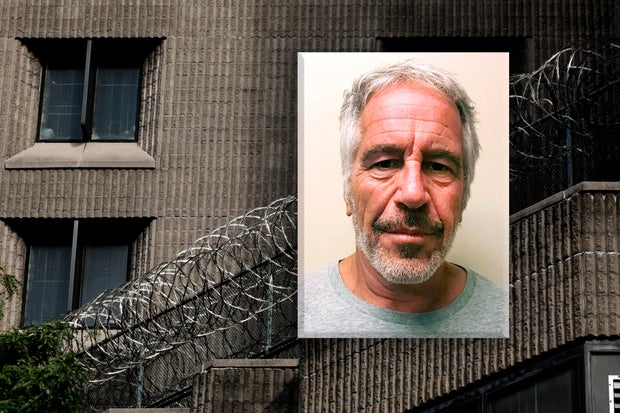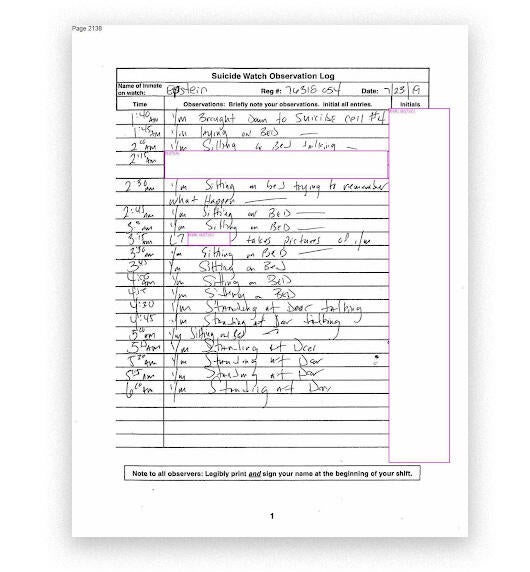The night Jeffrey Epstein claimed his cellmate tried to kill him
Jeffrey Epstein lay in the fetal position on the floor of his jail cell, unresponsive, with an orange fabric noose tied around his neck. The post-midnight quiet of the Metropolitan Correctional Center's secure housing unit was punctured as a corrections officer called for help.
It was 1:27 a.m. on July 23, 2019, 18 days before Epstein's death. He was breathing, his eyes opening and shutting occasionally, but he wouldn't, or couldn't, respond to officers' questions and commands, according to a confidential corrections officers' memo obtained by CBS News. They hoisted inmate 76318-054 onto a stretcher.
Federal officials have repeatedly said Epstein's eventual death by suicide was foreshadowed by this earlier alleged attempt. Former Attorney General Bill Barr reiterated that claim in an August closed-door deposition before the House Oversight Committee, which released the interview transcript last week. Barr, who did not reply to questions from CBS News, said in his testimony he knew about the July 23 incident, which he "viewed as an attempted suicide." Barr said he considered it indicative of Epstein's "state of mind."
But jail staff memos and other never-before-reported documents obtained by CBS News, as well as interviews with more than a dozen people who interacted with Epstein before and after the incident, reveal a murkier picture than the one depicted by Barr. The new documents have surfaced amid persistent speculation over Epstein's death, despite officials' conclusions that he died by suicide.
As corrections officers entered Epstein's cell on July 23, they were greeted by a chaotic scene, according to a source close to the investigation.
"He's laying on the floor and his bunkie is screaming: 'I did nothing, I banged on my door to get him out of my cell,'" the source said. Corrections officers carried Epstein to a cell on a different floor as he remained unresponsive.
Moments after becoming alert, Epstein gave officers his first account of what happened, the records show. He told them he thought he had been attacked by his cellmate, an ex-cop who was awaiting trial on four murders.
"He sat up on the bed and began telling me that he [thinks] his bunkie … tried to kill him," a responding officer wrote in one memo. A senior officer wrote in a separate incident report that Epstein initially implicated his cellmate in the incident, claiming he had previously said things that made Epstein feel threatened.
Epstein would later back off the claim, saying instead that he couldn't remember what happened. Nicholas Tartaglione, the cellmate, has repeatedly disputed the initial allegation and said he tried to revive Epstein. As with Epstein's eventual death, any camera footage of the incident was either mislaid, lost or never captured by the facility's faulty system.
Tartaglione has not responded to emailed questions from CBS News. His lawyer said Epstein's initial claim that Tartaglione tried to kill him was flatly "not true."
"He saved his life the first time," said Inga Parsons, the attorney. Tartaglione said in a recent interview with the podcast "House Inhabit" that Epstein also left a suicide note and had even offered Tartaglione money to kill him. Neither of those details, if true, are referenced in any of the Bureau of Prison records that were reviewed by CBS News.
News outlets have reported previously on Epstein's allegation and investigators' conclusions — or lack thereof — about the incident.
Epstein expressed concern about his cellmate the day before the incident, according to a corrections memo and a source who agreed to speak with CBS News on the condition they not be identified.
Epstein claimed to both the corrections officer and the source that he felt threatened by Tartaglione, a hulking retired cop-turned-drug-dealer, who was charged and later convicted for four murders.
Epstein said to the officer that he hadn't previously been comfortable reporting the alleged threat because "his bunkie told him that if he beat him up, because of [Epstein's child sex trafficking] charges, the officers would not report it."
The wealthy former financier told jail officers that he believed Tartaglione was trying "to extort money from him and stated that if he didn't pay him that he would beat him up," the officer wrote. "He stated that this has been going on for a week."
Epstein told a different officer that on the eve of the July incident, his cellmate had gotten ahold of a copy of the New York Daily News. Epstein — a former financial adviser, confidant to some of the world's most powerful people, and prolific sexual abuser of girls and young women — said Tartaglione pointed to a story about Epstein in the paper. Tartaglione said it placed his net worth at $77 million, according to Epstein. (That figure instead matches a valuation for Epstein's New York mansion cited in multiple articles in the paper that month.)
Epstein said he crumpled up the article and threw it out and turned in for bed. He told an officer he remembered waking up at 1 a.m. to get a drink of water, and walking back to his bed. The next thing he recalled, he said, was roughly half an hour later when corrections officers rushed into his cell.
Epstein initially said he thought he was attacked, but later equivocated. He asked to be put back in the same cell with Tartaglione, according to a 2023 report by the Department of Justice inspector general, but also insisted he would never have tried to kill himself.
After the incident, Epstein was moved to a room where he was placed on suicide watch and closely monitored for the next 31 hours. In his first minutes there, he twice "sat on the edge of the bed and began moving forward as if he was attempting to fall over head first," a corrections officer wrote. Told to stop, Epstein responded, "'Okay, I won't do it again,' and gave the thumbs up."
Another corrections officer assigned to watch over Epstein in the hours following the July 23 incident was Michael Thomas, according to a document obtained by CBS News. Thomas is the officer who discovered Epstein dead in his cell on Aug. 10, 2019, according to the Justice Department. He and another officer were later charged with falsifying documents related to the night of Epstein's death, but those charges were dropped.
Because Epstein was on suicide watch after the July 23 incident, Thomas was required to record a log of observations about Epstein in 15-minute increments.
Those notations were released by the Bureau of Prisons in 2023 along with just one entry he made in the log: a note made at 2:15 a.m., 45 minutes after the incident.
Fifteen minutes later, at 2:30 a.m., Thomas wrote, "[inmate] sitting on bed trying to remember what happened."
Around that time, a corrections supervisor was interviewing Tartaglione about the incident.
Tartaglione said he had given the bottom bunk to Epstein because "he was old," and had moved his own mattress to the floor. Tartaglione told a corrections officer he was sleeping with his headphones on when he felt something hit his legs.
"Jeff, what [are you] doing?" Tartaglione said he asked into the darkness. He said he turned on the light and found Epstein, sitting, slumped on the floor, "leaning to the side with his eyes opened," but unresponsive, with fabric around his neck, according to another officer's memo.
Tartaglione said he then yelled for jail staff.
Documents reviewed by CBS News do not indicate what steps jail staff took to investigate Epstein's allegations related to Tartaglione. In response to questions from CBS News, the Bureau of Prisons said the agency does not provide information related to investigations.
The jail's chief psychologist later speculated to investigators for the inspector general that there were three possible explanations for the incident: In one version of events, she wrote, either Epstein or Tartaglione were gaming the system to get something they wanted; another explanation was that Epstein had conducted a rehearsal of his eventual suicide; a third possibility was that, as Epstein initially claimed, he was assaulted. She told investigators that she considered the third scenario less plausible, "although she did not know for certain."
Epstein remained on suicide watch for a little more than a day; during that time, inmate volunteers kept logs, briefly documenting check-ins at 15-minute intervals. The morning updates were largely mundane: "inmate Epstein is pacing around," "inmate Epstein is hungry," "inmate Epstein washed his neck." By the next evening, he became more chatty, according to the logs: "I/M (inmate) Epstein is talking about finance," "I/M Epstein is talking about science," "I/M Epstein is talking about math," "I/M Epstein is talking about the prison environment," "I/M Epstein is talking about his experience teaching mathematics and physics," one volunteer wrote in successive updates.
On the morning of July 24, Epstein's status was downgraded from suicide watch to psychological observation. That day, a regional administrator who oversaw more than a dozen jails and prisons asked for an explanation of the change. Inmates placed under psychological observation, as opposed to suicide watch, were considered "not imminently suicidal," he was told. One of the forensic psychologists told investigators it was "not healthy for inmates to stay on suicide watch for extended periods of time." She observed signs of positivity and that Epstein "adamantly denied suicide."
Even the downgraded status bothered Epstein, the records show. He insisted to jail staff that he wouldn't try to kill himself.
"He denied feeling hopeless. He is reporting positive future plans and reasons to live for," one staffer wrote in an Aug. 1 report. He described himself to one source that week as "too much of a coward" to kill himself, and wondered aloud to another source if the incident had been a prank gone wrong.
The event was expunged from Epstein's official record after the jail's disciplinary proceedings failed to prove he committed self-mutilation.
Following the incident, Epstein expressed concern to Bureau of Prison employees about being housed back in the same unit, saying he "felt it was dangerous," according to the IG report.
Epstein was assigned a new cellmate, Efrain Reyes, and moved back on July 30. Nine days later, Reyes was transferred.
As night fell, Epstein found himself without a bunkie.
Hours later, the early morning quiet of the secure housing unit was once again punctured as a corrections officer called for help. Epstein was once again on the floor of his cell. This time, his body was cold to the touch.
Jeffrey Epstein Case More
